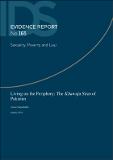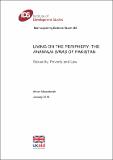| dc.contributor.author | Majeedullah, A | |
| dc.coverage.spatial | Pakistan | en |
| dc.date.accessioned | 2016-01-27T10:20:03Z | |
| dc.date.available | 2016-01-27T10:20:03Z | |
| dc.date.issued | 2016-01 | |
| dc.identifier.citation | Majeedullah, A. (2016) Living on the Periphery: The Khawaja Siras of Pakistan, IDS Evidence Report 165, Brighton: IDS | en |
| dc.identifier.uri | https://opendocs.ids.ac.uk/opendocs/handle/20.500.12413/8015 | |
| dc.description.abstract | Academic literature suggests that development is inherently heteronormative in its narratives, policies and practices: as a result, ‘heterosexuality is normalized, naturalized, and privileged in societies of the global South, in the international development field, and in colonial and post/neo-colonial narratives of the so-called Third World or global South’ (Lind 2010: 7). Thus, people with non-conforming gender and sexual identities living in poverty are rendered invisible in development. In an attempt to counter this invisibility, this report investigates the experiences of exclusion encountered by Khawaja Siras, a gender and sexual minority in Pakistan. It also investigates the role of a gender identity-based programme in bringing about changes in their experience of exclusion. | en |
| dc.description.sponsorship | UK Department for International Development | en |
| dc.language.iso | en | en |
| dc.publisher | IDS | en |
| dc.relation.ispartofseries | IDS Evidence Report;165 | |
| dc.relation.ispartofseries | IDS Evidence Report Brief;165 | |
| dc.rights.uri | http://creativecommons.org/licenses/by/3.0/ | en |
| dc.subject | Sexuality and Development | en |
| dc.title | Living on the Periphery: The Khawaja Siras of Pakistan | en |
| dc.type | IDS Evidence Report | en |
| dc.rights.holder | IDS | en |
| dc.identifier.ag | OT/11009/6/2/4/608 | |
| dc.identifier.ag | OT/11009/6/2/4/609 | |



